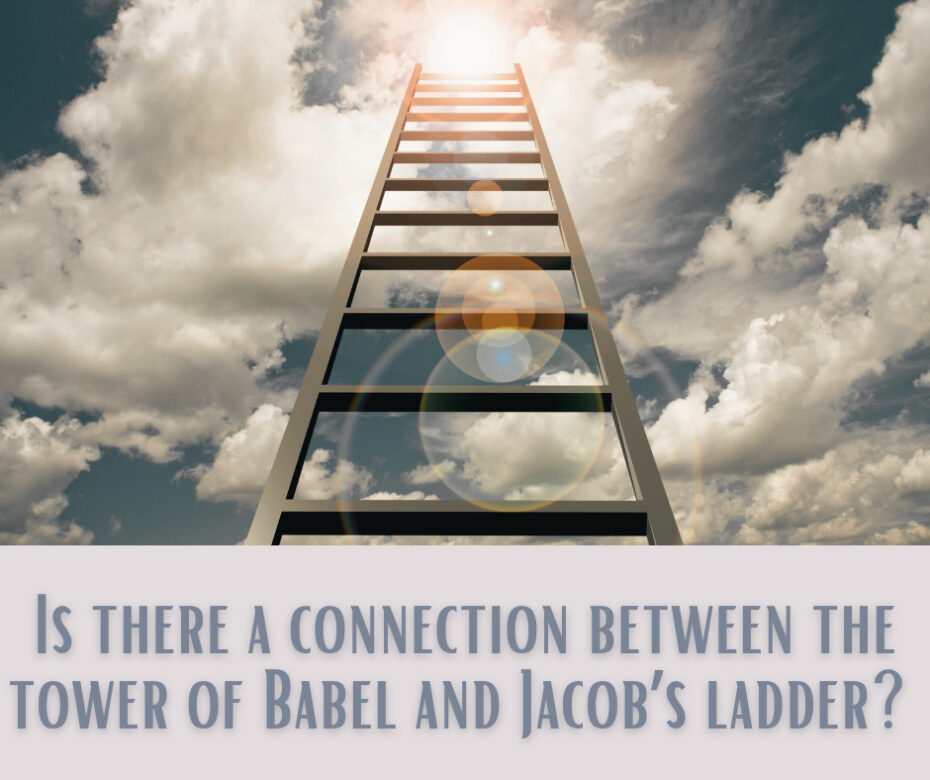Jacob was leaving the Promised Land to go to Padan Aram to find a wife among his mother’s people. He was away from the place where God had promised to bless the descendants of Abraham and Isaac.
He is now in great danger. He is alone. He has no bodyguards. There is no one to protect him.
But God wants Jacob to know that He will protect him wherever he goes.
Jacob’s dream recorded in Gen 28:10-22 is an amazing expression of God’s love, mercy, and grace. In it, God reiterates the promises He made to Abraham in Genesis 12:1-3.
Ladders allow people to climb up and reach things they would not normally reach. This “ladder” extends all the way from earth to the third heaven, where God’s shekinah glory is manifested.
The ladder that Jacob saw might also have been called a stairway. Some commentators have suggested that it might have been like a ziggurat, except that in this case, God has put it in place, not man.
Considering the entire OT, we would guess that the ladder or stairway is the Messiah. The NT confirms that assumption. More on that in a moment.
When he awoke, Jacob responded in worship to what he had just seen and heard.
Some think that Jacob was an unbeliever in Genesis 28 and that he came to faith two decades later when he wrestled with the Lord (Genesis 32). See this article by Kathryn Wright for evidence that Jacob was already a believer when he received the dream about a ladder.
There is a contrast here between Bethel and Babel (Genesis 11). At the Tower of Babel, mankind thought wrongly that they could reach God through their own efforts. At Bethel, Jacob learned (or was reminded) that the communication between God and man is initiated by God, not by us.
People want to dictate to God what they must do to spend eternity with Him. Works salvation makes sense to them. So, they seek to reach God by building a stairway of their works.
Jacob’s ladder is a reminder that God is God. God is in charge. We do not dictate to Him. He tells us. It is our job to submit to what He commands.
Most commentators recognize that John 1:51 looks back to Jacob’s ladder in Genesis 28:12.
Jesus referred to Himself as the Son of Man. He said the angels ascend and descend upon Him.
We should not think that the Lord is speaking literally about angels ascending and descending upon Him. This is figurative language. The Son of Man bridges heaven and earth.
Son of Man is a Messianic title looking back to Dan 7:13.
J. Ramsey Michaels suggests that the plural you in verse 51 refers not merely to those present when Jesus spoke, but to the readers of John’s Gospel as well. The fourth Gospel presents ample proof–signs–that Jesus is the Son of Man who is the Mediator between God and man. Michaels writes, “Whatever experiences are in store for Jesus’ disciples are in store for us as well—not just vicariously but actually—as we read the Gospel and enter into its world (compare 20:29-31).”
During the life and ministry of Jesus there was clear evidence that He is the Messiah, the Son of God, and the Son of Man. Most likely, this concerns manifestations of the glory of God in Jesus.
This could look, at least in part, to Jesus’ baptism. The Spirit descended upon Him there, and the Father pronounced Jesus His beloved Son.
This could also look in part to the Mount of Transfiguration when Jesus’ glory was displayed, and the Father again pronounced Jesus as His beloved Son.
But more than anything, this likely looks at the various signs that Jesus did, eight of which are laid out in John’s Gospel.
Jesus is the Mediator between God and man.
Jacob saw steps leading from God to man and rightly understood it to mean that God promised to be with him and protect and bless him. Yet there was more to the dream than that. That ladder or stairway was a type of Christ. God would bless and protect Jacob and the Nation of Israel through the Messiah.
God blesses the whole world through Abraham and his descendants by means of the Messiah.
From Jacob’s ladder, we are reminded that Jesus is the bridge between God and man, that all the earth is God’s house, that it is appropriate to respond to God’s blessing with worship, service, and gifts to Him, and that OT believers were not dunderheads who knew very little about God and the Messiah.
We have access to God because of the Lord Jesus.
Our appropriate response to the vision of Jesus as Jacob’s ladder is praise, commitment, obedient service, and giving of all we have.
Remember Jacob’s ladder.


